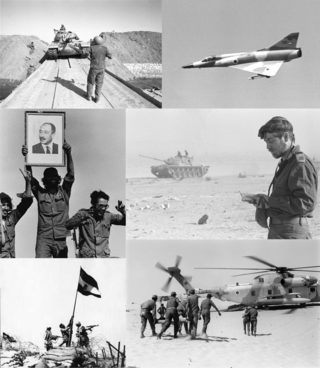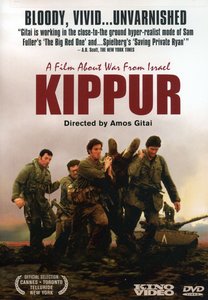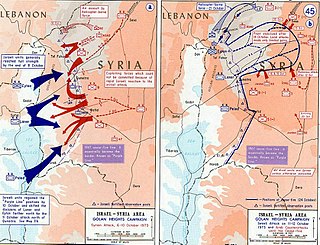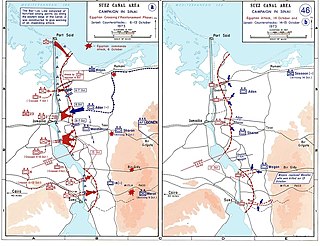
The Yom Kippur War, also known as the Ramadan War, the October War, the 1973 Arab–Israeli War, or the Fourth Arab–Israeli War, was an armed conflict fought from October 6 to 25, 1973, between Israel and a coalition of Arab states led by Egypt and Syria. The majority of combat between the two sides took place in the Sinai Peninsula and the Golan Heights—both of which were occupied by Israel in 1967—with some fighting in African Egypt and northern Israel. Egypt's initial objective in the war was to seize a foothold on the eastern bank of the Suez Canal and subsequently leverage these gains to negotiate the return of the rest of the Israeli-occupied Sinai Peninsula.

The War of Attrition involved fighting between Israel and Egypt, Jordan, the Palestine Liberation Organisation (PLO) and their allies from 1967 to 1970.
The history of the Israel Defense Forces (IDF) intertwines in its early stages with history of the Haganah.

The 1st "Golani" Brigade is an Israeli military infantry brigade that is subordinated to the 36th Division and traditionally associated with the Northern Command. It is one of the five infantry brigades of the regular Israel Defense Forces (IDF), the others being the Paratroopers Brigade, the Nahal Brigade, the Givati Brigade and the Kfir Brigade. Its symbol is a green olive tree against a yellow background, with its soldiers wearing a brown beret. It is one of the most highly decorated infantry units in the IDF. The brigade consists of five battalions, including two which it kept from its inception, one transferred from the Givati Brigade (51st).

Peter John Snow is a British radio and television presenter and historian. Between 1969 and 2005, he was an analyst of general election results, first on ITV and later for the BBC. He presented Newsnight from its launch in 1980 until 1997. He has presented a number of documentaries, including some with his son, Dan Snow.

Aerial supremacy is the degree to which a side in a conflict holds control of air power over opposing forces. There are levels of control of the air in aerial warfare. Control of the air is the aerial equivalent of command of the sea.

Israel Tal, also known as Talik, was an Israel Defense Forces (IDF) general known for his knowledge of tank warfare and for leading the development of Israel's Merkava tank.

David "Dado" Elazar was the ninth Chief of Staff of the Israel Defense Forces (IDF), serving in that capacity from 1972 to 1974. He was forced to resign in the aftermath of the Yom Kippur War.

Battlefield Britain is a 2004 BBC television documentary series about famous battles in British history. The 8 part series covers battles from Boudicca's rebellion against the Romans in 60AD to the Battle of Britain in 1940 it also covers the impact and implications the battles had on the future of the British isles.
The Agranat Commission was a National Commission of Inquiry set up to investigate failings in the Israel Defense Forces in the prelude to the Yom Kippur War, when Israel was found unprepared for the Egyptian attack against the Bar Lev Line and a simultaneous attack by Syria in the Golan—the first phase in a war in which 2,812 Israeli soldiers were killed.

Kippur (כיפור) is a 2000 Israeli drama war film directed by Amos Gitai. The storyline was conceived from a screenplay written by Gitai and Marie-Jose Sanselme; based on Gitai's own experiences as a member of a helicopter rescue crew during the 1973 Yom Kippur War. The film stars actors Liron Levo, Tomer Russo and Uri Klauzner in principal roles.
Operation Model 5 is the name of an Israeli Air Force operation, and the common name for the ensuing anti-aircraft battle, which took place over the Golan Heights on the October 7, 1973, the second day of the Yom Kippur War.

The Third Battle of Mount Hermon was fought on the night of October 21–22, 1973, between the Israeli Army and the Syrian Army over Mount Hermon, during the last days of the Yom Kippur War. Syrian troops had captured the IDF outpost on the mountain on October 6, and held it for two weeks. In the third battle, codenamed Operation Dessert, Israeli troops captured the Israeli outpost and the Syrian one.

The Battle of the Sinai was one of the most consequential battles of the Yom Kippur war. An Egyptian attacking force that advanced beyond their line of defense at the Bar-Lev Line was repulsed with heavy losses by Israeli forces. This prompted the Israelis to launch Operation Abiray-Lev the next day, penetrating the Egyptian line of defense and crossing the Suez Canal.
Egyptian 25th Brigade ambush was a battle that occurred on October 17, 1973, the eleventh day of the Yom Kippur War, east of the Great Bitter Lake, in the Sinai Peninsula. The ambush was conducted by the Israel Defense Forces' 162nd Division, against the 25th Brigade of the Egyptian army. The Israelis' goal was the destruction of the brigade, which attempted to disrupt the Israeli crossing of the Suez Canal.

This article deals with the history and development of tanks of the Israeli Army, from their first use after World War II in the establishment of the State of Israel after the end of the British Mandate, and into the Cold War and what today is considered the modern era.

Ran Goren is a retired fighter pilot and Major General of the IDF, former Deputy Commander of the Air Force and Head of the Manpower Directorate.

The Bashan Salient was a territory in Southwestern Syria which was conquered by the Israeli Army during the 1973 Yom Kippur War. The salient was about twenty kilometres wide and encompassed an area of approximately 400km2, extending to a point 33 kilometres from the Syrian capital of Damascus. The Salient was evacuated by the Israeli army shortly after the signing of a disengagement agreement between the Israeli and Syrian forces on May 31, 1974. The Salient included the summit of Mount Hermon, the town of Beit Jinn, and many other Syrian villages.
Valley of Tears, is an Israeli television mini-series directed by Yaron Zilberman based on a screenplay by Ron Leshem and starring Aviv Alush, Joy Rieger and Lior Ashkenazi. Development of the series lasted about a decade and its filming took place over 52 days starting on July 21, 2019. The premiere episode of the first season aired on Kan 11 on October 19, 2020. It was subsequently licensed by HBO Max, airing on November 12, 2020.














